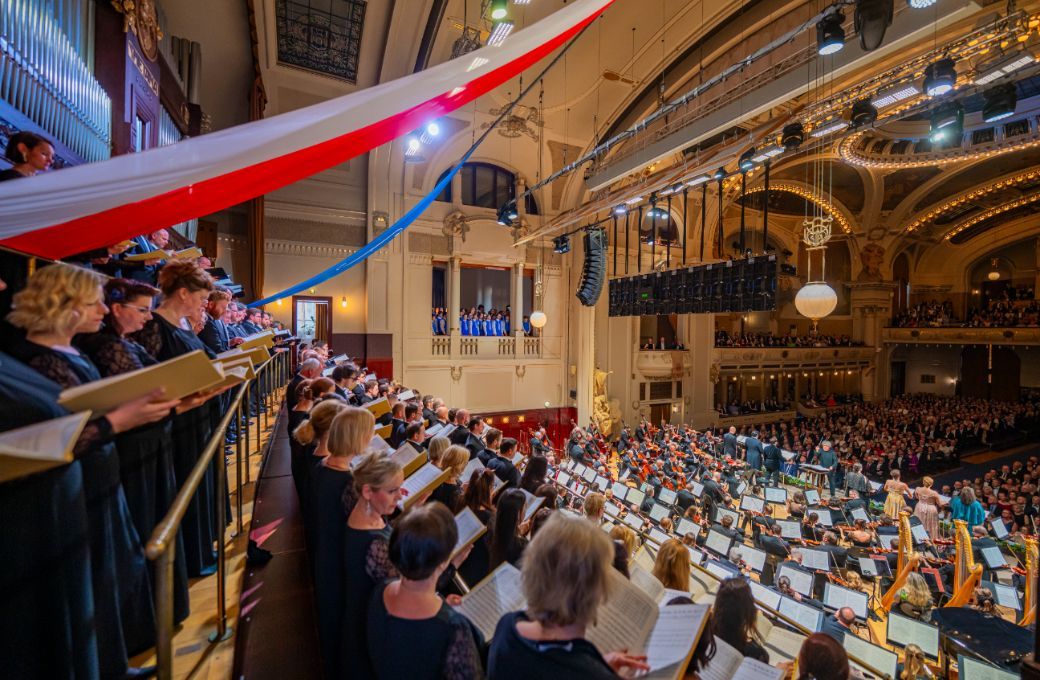Prague’s sumptuous Smetana Hall seats 1,200, but even that enormous space was barely enough to contain Mahler’s “Symphony of a Thousand”, especially with a capacity crowd on hand for the closing concert of Prague Spring. A brass ensemble hovered in the highest side balcony, singers were in the wings, and on the podium Semyon Bychkov conducted the Czech Philharmonic, three choruses and eight soloists like a lone cop directing traffic on the freeway. The results were just short of ecstatic.

That was the promise in the magisterial opening chord, which set the template of a bold orchestra sound in the first movement matched by equally powerful work from the two mixed choruses. Both the Prague Philharmonic Choir and the Czech Philharmonic Choir of Brno are noted for their sharp, sensitive work, and in this outing were notably expressive, adding fine gradations to the “Veni, veni creator spiritus” invocation. The quartet of female vocalists onstage matched the choirs’ intensity, though some of their ensemble work was lost in the thunder of the combined choral–orchestral sound. Still, there was no mistaking the yearning in their singing, nor the fervor of the heavenly entreaties ascending from the stage in a resounding climax.
The lengthy second movement gave Bychkov an opportunity to slow the pace, let details emerge and highlight the intimate moments in a monumental work. The prelude was particularly strong in that regard, gauzy and atmospheric, with glimmering woodwinds adding a soothing touch. The choirs brought in the anchorites with hushed whispers, neatly setting up the male vocalists, starting with a strong showing by Adam Plachetka as Pater Ecstaticus. Last-minute substitute Derek Welton filled in nicely as Pater Profundus, but David Butt Philip sounded strained in the principal male role of Doctor Marianus, his tenor no match for the surging orchestra.
With a bright introduction from the young angels of the Kühn Children’s Choir, the women fared better. Sarah Wegener offered an impassioned Magna Peccatrix, and local favorite Kateřina Kněžíková was a lustrous Una Poenitentium, hitting impossibly high notes with smooth efficiency. Stefanie Irányi handled the role of the Mulier Samaritana with sharp authority, complemented by a gentler scriptural reading from Jennifer Johnston as Maria Aegyptiaca. From offstage, Miriam Kutrowatz’s two lines as Mater Gloriosa floated gracefully through the calm preceding Faust’s ascension to heaven, which was gilded with gleaming accompaniment from the four harps.
Bychkov’s mastery of the material was evident in his superb control of the dynamics, setting up powerful contrasts that created a narrative, and the great clarity of the sound throughout the entire piece, with barely a note lost in the towering soundscapes. The many disparate elements of the second movement came together in a seamless flow that led to a finish like the tide coming in, inexorable, overwhelming and ultimately transcendent. If the roof had suddenly opened to let in rays of divine light, it would have been no surprise.
A finely tuned performance of this caliber depends a great deal on the relationship between conductor and orchestra, which in this case was a model of artistic synergy. Bychkov and the Czech Philharmonic have been sharpening their Mahler in a well-received series of recordings of his symphonies, and the expertise in interpretation, discipline in the playing and the chemistry in their relationship was on full and persuasive display here. If not quite heavenly ecstasy, the music was about as close as it gets in the material world.


